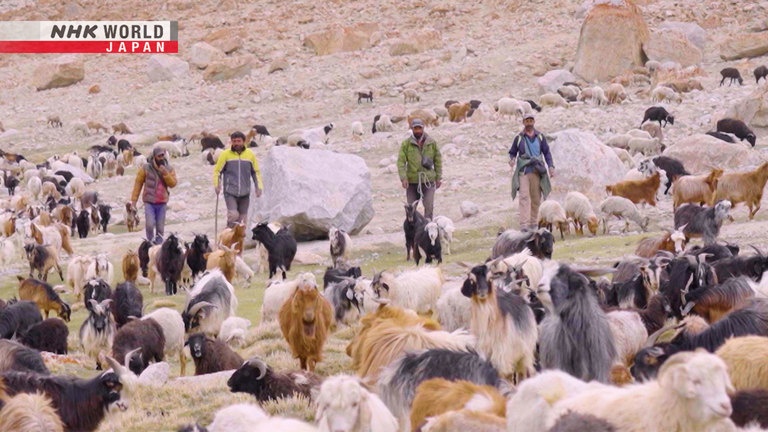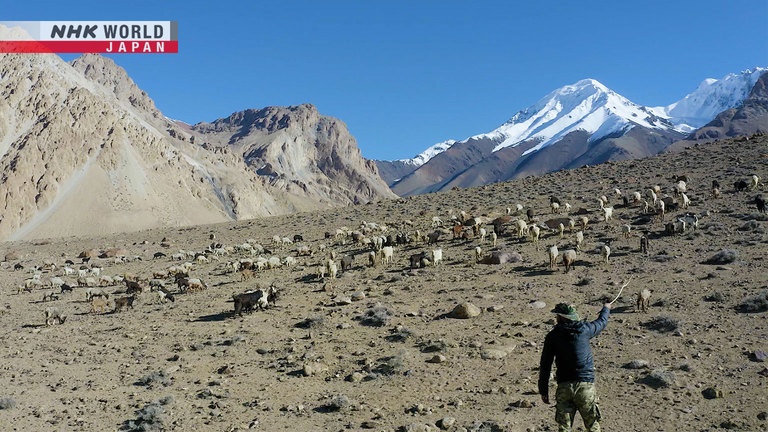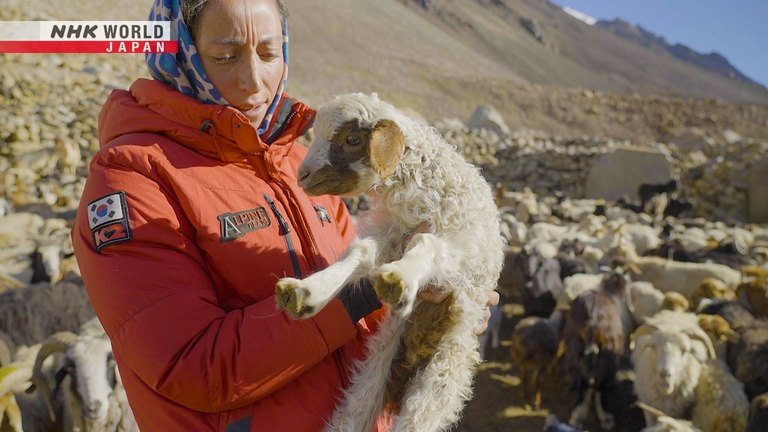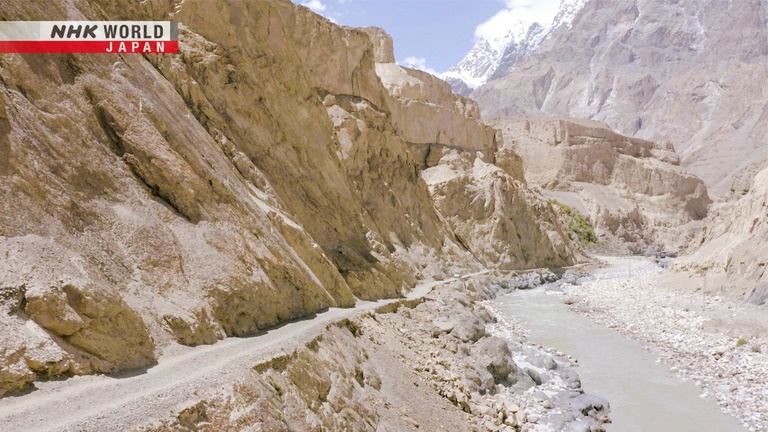Herding Above the Clouds: Pakistan
For generations, Pakistan's Wakhi people have herded each summer in Pamir, a high-altitude grassland that is vital to raising the livestock upon which they depend. The difficult trek there along winding mountain paths was once a summer ritual for families, but the tradition has changed since more people are deciding to keep their children in school instead. In this episode, we travel with the Wakhi people on a journey at risk of being lost to time.




Transcript
The Karakoram Range in Pakistan has summits exceeding 8,000 meters.
A herding society lives on the range.
It's mine.
They're known as the Wakhi people.
In summer, they live alongside their livestock in pastures far from their village.
They call this land Pamir, which means "grassy highlands" in the Wakhi language.
Pamir is a gift from God.
That's why our livestock grow.
It was tradition for Wakhi families to spend summers in Pamir, often with their children.
But all that has changed recently...
I want my kids to attend school.
We can't resist change.
Modernization is a good thing.
The people's way of life among nature is becoming less and less common.
This episode depicts the dilemma of how to continue a traditional mountain-faring herding life.
The Karakoram Highway runs through northern Pakistan.
After three hours on unpaved roads veering away from the highway is a village inhabited by the Wakhi.
Shimshal Village is embraced by the mountains.
The population is around 2,000.
At more than 3,000 meters in altitude, temperatures here sometimes fall to 5 degrees Celsius even in the summer.
With scarcely any rain, the village isn't suitable for agriculture.
That's why most people make a living raising livestock such as yaks, goats, and sheep.
But grass that the cattle feed on grows sparsely on such dry land.
To adapt, the Wakhi have created their own grazing methods.
In summer, we raise livestock in Pamir,
where the grass is rich.
Meanwhile, we cut and store village grass
to feed our livestock in winter.
Pamir is a gift from God.
That's why our livestock grow.
Pamir is rich with greenery, which serves as a lifeline for the Wakhi and their herds.
Zubaida Wahid was born and raised in Shimshal.
She plans to join the group taking their herd to Pamir the following day.
I look forward to going to Pamir.
Why do you shout "Pullshe!"?
That's a call to get the goats
and sheep walking.
It means "Keep going!"
The morning of their journey arrives.
As part of a custom praying for a safe journey,
the villagers spread wheat on the goats and sheep they'll guide.
In Shimshal, both men and women have long played the role of herders.
Zubaida will guide 30 goats and sheep.
More than half were entrusted to her by relatives.
I'm praying for your safety!
Take care!
Have a safe trip!
Allah will watch over you.
Take care!
If Allah wills it.
Don't worry. I'm strong.
Pamir is located upstream along the river running through the village.
To reach it requires a trek climbing 1,300 meters over three days.
Long journeys with livestock are called "Kuch" in Wakhi.
The villagers take turns on the Kuch, bringing a total of around 5,000 animals to Pamir over the course of a month.
This time, six people including Zubaida will guide 150 goats and sheep to their destination.
After a three-hour walk, the group stops for lunch.
Meals during Kuch are very simple.
Today's lunch is chai with plenty of sugar, and bread baked for them by family.
- You want more?
- Hang onto it.
When I was young, I went to Pamir
with my grandmother.
I've gone maybe 60 times.
The cattle raised in Pamir this summer will be sold in the fall for around 70 US dollars per sheep and 90 per goat.
Carrying the assets of the entire village is a considerable responsibility.
After walking six hours, the group arrives at their accommodation.
I'm not that tired.
My parents taught me how to take
care of livestock when I was a child.
I also learned from my grandmother
who went on Kuch for 20 years.
This is no good!
This water is melted snow from the mountains.
Water supplies are prepared at several accommodations along the Kuch route.
To protect livestock from wolves and snow leopards,
they stack up rocks to build a safe enclosure and keep them there.
This is another task during Kuch.
These facilities along the route are shared assets among all villagers, available to any of them.
People rest in huts made of rocks and sand.
Passersby use them, and then fix them when they become broken so that the next group can do the same.
The Wakhi people of Shimshal Village have engaged in Kuch for roughly 400 years.
Zubaida is engaged to be married to a man from the village in October.
Her fiance is working in the city.
Her parents had hoped to see her wedding.
But Zubaida shows a melancholy expression, stemming from her current situation.
My parents died recently.
It makes me sad to remember them
in the village.
I hope this Kuch can ease my pain.
Zubaida lost her mother three years ago.
Before that pain had healed, her father passed in July of 2022.
Both deaths were sudden and unexpected.
I always traveled with my father.
But he's not here this year.
I have to be stronger.
For Zubaida, this Kuch is an opportunity before marriage to reflect upon the memories of her parents.
The second day of Kuch is the hardest of the three, because of the drastic change in elevation.
The narrow path was made by carving into the steep mountain slopes.
Both livestock and people walk in a single file.
The path is just 1 meter wide.
There are even falling rocks.
It's perilous terrain, but familiar for the Wakhi.
Their ancestors developed the path and have walked it for generations.
It's a baby goat.
Their cattle are like family.
Zubaida carries the little goat in her arms for safety.
"We'll travel with a strong
heart and body."
"Keep it up!"
At last, the final day of Kuch.
In the morning, they count the livestock to ensure they're safe.
Sometimes, new lives are born during the journey.
We tell them apart with ear tags
and marks.
I cut their ears and
attach the white tags.
This is my marker.
The last day's trek requires reaching 4,000-meter-plus altitudes.
It's 10 more kilometers to Pamir, but there is still no greenery in sight.
Rahmat Ali is 24.
Rahmat lives outside the village.
He joined Kuch at the request of his family because they needed more help.
Aside from livestock, I have
a different business.
Rahmat studied economics at a two-year college in the Pakistani capital of Islamabad.
Now he runs a jewelry shop along the highway with his older brother.
For Rahmat, Pamir is a place filled to the brim with childhood memories.
When I went there for the first time
at age 6 with my mother, I rode a yak.
Many people used to go to Pamir.
This footage is from 1997, when many people still took their entire families on Kuch to spend the summer in Pamir.
Children learned how to live in harmony with animals.
So many kids had joined Kuch.
But now, villagers are focused
on educating their kids.
The Wakhi's traditional lifestyle passed on for generations is facing a turning point.
It all started with a single road.
In 2004, a road connecting Shimshal Village and the highway opened.
This meant that what once took a three-day walk could be replaced by a three-hour drive.
With this, the outside world suddenly grew closer, changing the mindsets of the villagers.
This is a school located in Shimshal.
Almost 300 students from kindergarten to high school age attend.
Enrollment is increasing every year.
Now that villagers have easy access to the outside world,
their top priority is to give children an education to expand their job opportunities.
All teaching materials are in English,
since it's considered essential for succeeding in business or in society at large.
Education is very important
to learn about the world.
Without an education, life is hard.
I want a career in the city,
to help the village.
The old lifestyle was hard and
lacked chances for an education.
Now we can study and choose other jobs.
I can't live the traditional way.
It's too physically demanding.
When Rahmat left the village to study, his parents sold their animals to pay for his tuition.
We can't resist change.
Modernization is a good thing.
I have many fond memories.
But the traditions are disappearing.
I plan to learn more about management,
and focus more on business.
On the third evening after leaving the village, the group arrives at the entrance of Pamir.
As usual, the livestock are kept in an enclosure.
Tomorrow morning, the grazing will begin.
Here you go.
I've got this.
There are villagers stationed in Pamir to care for the livestock.
The arriving group leaves their animals here.
We'll check to see that every
goat and sheep got here.
Zubaida and the others have safely delivered all 150 of the goats and sheep.
The next morning, the people stationed there take roughly 2,000 animals out of the enclosure, including the new arrivals.
They're heading to the grazing areas in Pamir.
Verdant grass spreads over the 4,350-meter-altitude area.
This land is the paradise of the Wakhi people.
Studies show that during the summer, Pamir gets five times the amount of rain as in Shimshal Village.
The Wakhi believe that the grass here is full of minerals and other nutrients.
Villagers take turns watching over livestock.
The lengths of their shifts depend on the number of livestock they own.
Roughly 10 villagers are on duty at any given time.
The shift system began almost ten years ago to maintain the grazing custom,
since fewer villagers could stay for long periods.
Shift leader Karim Baig was born in Pamir half a century ago.
He enjoys the job but has mixed feelings about life here.
This culture will likely end
with our generation.
Unlike before, we can get
an education.
People are living better lives.
We don't recommend this lifestyle
to our children.
The Wakhi have homes in Pamir to spend their summers here.
Zubaida's house is filled with her memories.
I slept here as a child.
My father made this stove.
Instead of wood,
we use dried yak dung.
Since I've been gone a while,
I kissed the stove first.
This is the first time Zubaida has visited Pamir since her father passed.
Many things have changed.
So many people were here before.
Now it's a bit lonely.
There are around 60 homes in this area.
Each has been passed on for generations.
Nearly 100 people used to spend their summers here.
But now, many of the homes are left empty.
I miss the old view.
Everyone is busy now...
After taking the livestock to Pamir, Zubaida returns to her village.
She plans to start preparing for her wedding.
I think going to Pamir
made me feel better.
I can firmly say that
I want to visit it again.
Now that she's starting a new life with her own family, she has all the more to look forward to.
I'd like to go to Pamir with
my husband.
I want to take our time
on the journey together.